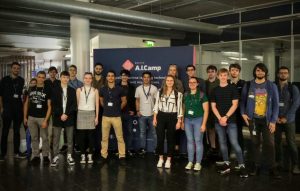Meet the company making artificial intelligence real in the West Midlands

Image by Mike MacKenzie via www.vpnsrus.com
The idea of artificial intelligence has been around for far longer than the technology to make it happen.
But the arrival of the fourth industrial revolution, and the advancements in computing power – and in particular its affordability and accessibility – puts us on the cusp of revolutionary change.
In Birmingham this week, there is a reminder of how long the gestation period has been.

Alan Turing as portrayed in Breaking the Code at Birmingham’s Crescent Theatre
The Crescent Theatre is showing Breaking the Code, a play about the life of Alan Turing. It was first staged 30 years ago, when it was already 30 years since Turing’s death.
Turing was a mathematician who had a central role in breaking the German Enigma code during World War II and was an early proponent of the potential of artificial intelligence.
In the play, he says: “It’s not breaking the code that matters – it’s where you go from there.”
Later, he expands on what could one day be possible.
“I can see no reason at all why a thinking machine should not be kind, resourceful, beautiful, friendly, have a sense of humour, tell right from wrong, make mistakes, fall in love, or enjoy strawberries and cream,” he says.
Cultural activities, like art and music, have always been held up as among the most human traits, and therefore hardest to imitate or replicate.
But one step forward is happening soon when holograms of Abba – “Abbatars” – are going on tour as the 1979 version of the Swedish pop group. But the Abbatars will also be performing two new songs.
And Abba songwriter Bjorn Ulvaeus thinks we are about five years away from artificial intelligence being able to create songs that are a match for professional songwriters.
The impact of AI technologies is expected to be transformational, and one business in Birmingham is already making its mark.
Kainos, which employs more than 1,300 staff in 11 offices across Europe and the USA, moved into the city earlier this year. It plans to have 60 people in its Birmingham team by the end of the year and 200 within three years.
As part of its growth, Kainos ran an AI Camp last month with undergraduates from the city to provide a gateway to the technology.
“AI is a foundational technology like electricity,” said Tom Gray, chief technology officer at Kainos.
“With AI Camp we are trying to give students that foundational learning for when they start to go on to advanced models and when they come out into industry.”
The culmination of the two weeks was a two-day hackathon where teams competed to create their own project.

Undergraduates at the AI Camp run by Kainos in Birmingham
The winners, three undergraduates from the University of Birmingham, created their own algorithm which meant a machine could recognise and convert handwritten equations into code – a system which was judged to have “huge potential for helping to improve knowledge capture” in mathematics.
Gray said: “Over the two weeks, we have seen students displaying a genuine passion for AI. This was inspirational to witness, and has reaffirmed what we already knew of Birmingham’s tech scene.”
Kainos was attracted by the city’s “young, skilled workforce” and their belief that there was enough room within the digital sector to attract the right talent.
“We feel that as we grow – we are over 1,300 staff in 11 offices – we feel we need to build a degree of resilience as to how we service client demand,” said Gray. “It doesn’t make sense to do all that in Belfast or Gdansk, so we chose Birmingham as the development hub.
“The qualities we value are high-quality universities, a talent base and ideally a culture that would lend itself to a low attrition environment and value the opportunity to grow with the organisation.”
Gray, like chief executive Brendan Mooney, has been with the organisation for three decades, not long after the company had been created as a joint venture between Fujitsu and The Queen’s University of Belfast business incubation unit.
It has always had a focus on leading edge technology – “we probably won’t be first but we will be the fast second,” said Gray – and that has seen it evolve and change direction several times.
He said: “We have been at the leading edge of servers, the early adoption of the internet, Java, the backlash against the over-complexity of Java, and the use of more agile technology.
“Now we are looking at AI, VR, 5G networks.”
Kainos’s digital transformation emphasis is “as much on the transformation side as on the technology side”, avoiding the pitfall of creating systems that merely find a way to do the wrong thing more quickly.
“We have always tried to ensure that we focus on projects that add real value and those difficult digital problems,” said Gray.
“Today we find ourselves focusing on public sector, we also have a degree of interest in healthcare, that has ebbed and flowed.
“We are in the process of rebuilding our financial services business – there was a point in the late 00s when financial services was our biggest area, before the crash.”
AI has come to the fore now because of two factors – the availability of massive computing power, through platforms like Amazon Web Services, and the huge amount of data that now exists which can be used as knowledge.

Tom Gray, chief technology officer at Kainos
The digitisation of health records is opening up fascinating possibilities.
“There’s a really good story with breast cancer diagnosis,” said Gray. “Every mammogram has to be manually viewed or audited by two qualified personnel, not just one.
“What we have got is a data set that contains really high quality images of mammograms and really high quality metadata – what the diagnosis was, images that have been annotated – for 20 years.
“You can now take one person out of the process, and use a machine either to make the primary decision or to check the human’s work. That means you could double the number of scans at any given time.
“In medicine there is limited potential for jobs to be destroyed. AI will almost certainly be used to support, allowing you to do more with the same.”
AI’s potential impact on jobs is sometimes raised as a concern, although that has been the case with all new technology since the creation of the spinning jenny.
Trickier are the ethical considerations, for example around the use of face recognition or machines making phone calls as if they are humans, which they can now do realistically to, say, make a restaurant booking.
“As a technologist I tend to be optimistic,” said Gray.
“The low-hanging fruit is going to be on image recognition. Machine learning is going to be more consistent.”
The use of AI will change radically in the years ahead, but Gray wants a realistic approach to the standard that it is judged against.
“No AI or machine-learning algorithm is going to be perfect,” he said. “Do they have to be perfect? Or do they just have to be better than the average human?”
Which brings us back to the words the scriptwriters put into Turing’s mouth. What really matters is “where you go from there”.









